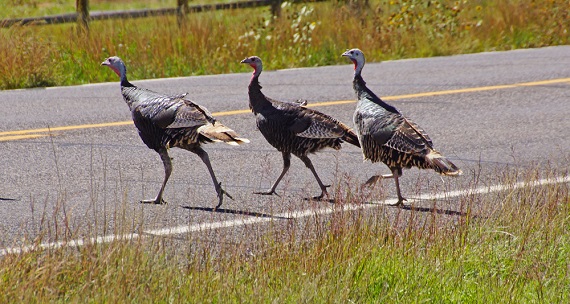Here in New England, this is a season when drivers have to be on the alert for wildlife. October to November is peak season for deer-animal collisions. Your normal odds of a ruminant-related collision claim is about 1 in 169, but the likelihood rises in this season – particularly at dawn and dusk. The Insurance Information Institute offers good tips on avoiding a deer-car collision, and advises that you think about including Comprehensive Coverage on your auto policy if you don’t already have it.
But there’s no safety in being a pedestrian, either – wild turkeys band together to brazenly terrorize cities and towns. Right now there’s a huge flock of birds behaving badly and taking over a New Jersey town.
This is a good news bad news story. A few decades ago, the US wild turkey population was dangerously dwindling. The good news is, the wild turkeys are back. And the bad news is the wild turkeys are back. When they are in the wild, they are fearful of humans – but when they get used to us, watch out. They can be very aggressive and chase people down. They are a particular threat to kids and the elderly, but grown adults are intimidated by 25-30 lb. birds that run at 15-20 mph, fly in short spurts and sport sharp talons and beaks. The best advice we’ve heard is that if turkeys adopt your neighborhood, when taking walks, carry an umbrella which you can open and close to look bigger in a show of dominance they might understand.
For your seasonal amusement, we bring you some clips of turkey terror. But be warned, there may be a bit of cussing.
For some reason, they are particularly aggressive to mail carriers
Here’s an overly dramatic but amusing compilation…
Here’s a good example why you should NEVER feed turkeys.
For more turkeys, see our prior post Real Life Angry Birds.
And geese are no better ….
Reprinted from Renaissance Alliance – no usage without permission.


